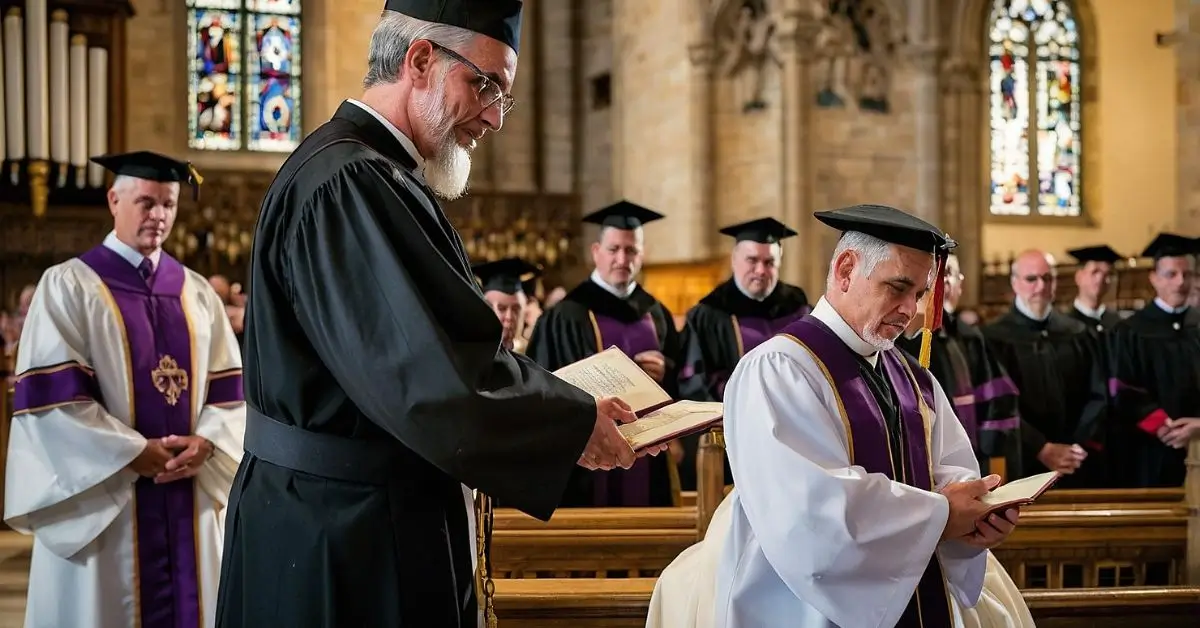The concept of ordination has deep roots in religious traditions, symbolizing the recognition of an individual’s calling to serve in a specific spiritual role. For many, becoming ordained is a deeply personal and meaningful decision, often involving a lifelong commitment to faith, service, and community leadership. Whether you’re interested in officiating weddings, leading religious services, or performing spiritual counseling, ordination is a crucial step.
This guide will explore what it means to be ordained, the various pathways to ordination, and the steps involved in becoming ordained, while offering insights into different religious traditions and legal considerations. By the end of this article, you’ll have a comprehensive understanding of how to embark on this sacred journey.
What Does It Mean to Be Ordained?
Ordination is a formal process by which a religious body grants authority to an individual to perform certain religious rites and ceremonies. The individual becomes a representative of the religious community, entrusted with the responsibility of leading worship services, administering sacraments, and guiding spiritual matters.
Traditionally, ordination has been the domain of formal, established religious institutions, such as Christianity, Islam, Judaism, and Buddhism. However, in recent years, more independent and non-denominational paths to ordination have emerged, providing more flexibility for individuals seeking to become ordained without adhering strictly to the tenets of established religions.
Responsibilities of Ordained Ministers
The specific duties of an ordained individual depend on the religious organization or tradition to which they belong. However, some common responsibilities include:
- Officiating weddings: Many people seek ordination to officiate weddings for family and friends. In some regions, being ordained is legally required to conduct marriage ceremonies.
- Leading worship services: An ordained person often leads regular worship services, preaching sermons and guiding prayers.
- Performing baptisms and funerals: In many traditions, ordination grants the authority to perform these important life ceremonies.
- Spiritual counseling: Ordained individuals are often sought after for guidance in spiritual matters, helping individuals navigate moral, ethical, and religious challenges.
- Administering sacraments: Depending on the tradition, ordained individuals may be responsible for administering sacraments such as communion or confession.
Pathways to Ordination
There are several pathways to ordination, depending on your personal beliefs and the specific requirements of your chosen religious tradition. Below, we explore the most common paths.
1. Ordination in Established Religious Institutions
For individuals pursuing a career as clergy within traditional religious institutions, the process of ordination is often long and involved. These institutions typically have rigorous requirements for ordination, including formal education, years of service, and approval from religious leaders.
a. Christianity
In Christianity, the process of ordination varies by denomination:
- Catholicism: In the Catholic Church, ordination is a sacrament conferred on priests, deacons, and bishops. The process involves many years of theological study, usually at a seminary, followed by service as a deacon before ordination to the priesthood. Candidates must also be approved by the church hierarchy.
- Protestantism: Protestant denominations, such as Baptists, Methodists, and Presbyterians, also have formal ordination processes, though they tend to be less centralized than in Catholicism. Candidates often need to obtain a degree in divinity or theology, followed by a period of mentorship or internship before ordination.
- Orthodoxy: In the Eastern Orthodox Church, ordination is also a sacrament. Candidates typically spend years in spiritual preparation, including theological education and participation in monastic life, before being ordained by a bishop.
b. Judaism
In Judaism, rabbis are typically ordained after completing rigorous studies at a rabbinical school. Ordination (semikhah) involves a combination of theological education, mentorship, and practical experience in a community. Rabbis play a key role in leading worship services, offering spiritual guidance, and interpreting Jewish law (Halakha).
c. Islam
Imams in Islam are not always formally ordained in the same way as clergy in other religions, but they often undergo extensive theological education in Islamic jurisprudence, theology, and the Quran. Imams are usually appointed by their community or mosque based on their knowledge and leadership abilities. In some traditions, a formal ordination or recognition process may be followed, particularly within the Shi’a branch of Islam.
d. Buddhism
In Buddhism, ordination typically refers to becoming a monk or nun. The process varies by sect, but generally involves formal vows, intense study, and commitment to monastic life. In some branches of Buddhism, lay ordination is also possible, allowing individuals to become ordained without committing to a full monastic life.
2. Online Ordination
In recent years, online ordination has become increasingly popular, especially for individuals who want to officiate weddings, perform other ceremonies, or start their own spiritual practice without going through the lengthy traditional process. Online ordination is typically offered by non-denominational or interfaith organizations and is recognized in many jurisdictions.
Some of the most popular online ordination providers include:
- Universal Life Church (ULC): ULC is one of the most well-known organizations offering online ordination. They have ordained millions of people, allowing them to officiate weddings, baptisms, and other ceremonies. The process is simple and usually requires only filling out an online form.
- American Marriage Ministries (AMM): AMM offers free ordination to individuals who want to perform marriage ceremonies. Their ordination is recognized in most U.S. states, making it a popular choice for wedding officiants.
- Open Ministry: Similar to ULC and AMM, Open Ministry provides ordination for individuals who wish to officiate weddings and other ceremonies. They offer various packages, including certificates, credentials, and training materials.
Online ordination can be completed in just a few minutes, making it an attractive option for those seeking a quick and straightforward path to ordination. However, it’s important to research the legal requirements in your area, as not all jurisdictions recognize online ordination for certain types of ceremonies.
3. Independent Ordination
Independent ordination allows individuals to create their own path to becoming ordained, often without aligning with any established religious institution. This option is appealing to those who wish to establish their own ministry or spiritual practice, often with a focus on interfaith, non-traditional, or alternative spirituality.
Many independent ministers start their own churches, ministries, or counseling services, drawing from a wide range of spiritual traditions. Independent ordination may involve creating a personal statement of faith, finding a mentor or spiritual guide, and gaining experience in religious leadership.
4. Interfaith or Ecumenical Ordination
Interfaith or ecumenical ordination is designed for individuals who wish to serve in a multi-faith capacity, embracing diverse religious traditions. Organizations like the Interfaith Minister’s Association and One Spirit Interfaith Seminary offer ordination programs that train individuals to serve in various religious and spiritual communities.
These programs often emphasize inclusivity, spiritual counseling, and community service, preparing individuals to officiate weddings, funerals, and other ceremonies for people of various faiths.
Steps to Becoming Ordained
The steps to becoming ordained will vary depending on the path you choose, but here’s a general outline of what you can expect:
1. Determine Your Path
The first step is deciding which type of ordination best aligns with your spiritual beliefs and goals. Are you seeking ordination within a specific religious tradition, or are you looking for a more flexible, non-denominational path? Your answer will guide your next steps.
2. Meet the Educational Requirements
For many traditional religious paths, formal education is required. This may involve obtaining a degree in theology, divinity, or religious studies from a seminary, college, or other accredited institution. For online or independent ordination, formal education is typically not required, though additional training or coursework in ministry, counseling, or leadership may be beneficial.
3. Gain Experience
Many religious organizations require candidates for ordination to gain practical experience by working in a community, leading worship services, or providing spiritual counseling. This helps build your skills and prepares you for the responsibilities of ordained ministry.
4. Complete the Ordination Process
Once you’ve met the necessary requirements, you can apply for ordination. For traditional religious institutions, this often involves a formal ceremony or service in which you are officially ordained. For online or independent ordination, you may receive your credentials by mail or electronically.
5. Stay Compliant with Legal Requirements
After becoming ordained, it’s important to ensure you are in compliance with any legal requirements in your area. This is especially crucial if you plan to officiate weddings or other legally recognized ceremonies. Check with your local government to ensure your ordination is valid for the services you intend to provide.
Legal Considerations
The legality of ordination varies by country, state, and region. While online ordination is recognized in many places, some jurisdictions may have additional requirements or restrictions. If you plan to officiate weddings, it’s crucial to confirm that your ordination is legally recognized in the location where the wedding will take place.
Researching Local Laws
In the U.S., for example, marriage laws differ by state. While most states recognize online ordination for wedding officiants, some may require additional documentation, registration with the local government, or even in-person ordination. It’s important to research the specific legal requirements in your area to avoid any complications.
Record Keeping and Documentation
After becoming ordained, be sure to keep copies of your ordination credentials, including certificates, letters of good standing, and any other relevant documents. If you’re officiating a wedding, you may need to provide proof of your ordination to the local authorities or include it when filing the marriage license.
The Role of Continuing Education
Even after ordination, continuing education can play a vital role in your spiritual and professional growth. Many ordained individuals pursue further training in areas like pastoral counseling, theology, and religious leadership to enhance their ministry. Some religious organizations require continuing education to maintain ordination status.
Online courses, workshops, and seminars are widely available for ordained individuals who wish to stay current on theological developments, spiritual practices, and ministry skills.
Conclusion
Becoming ordained is a deeply personal and transformative journey, one that opens the door to a lifetime of service, leadership, and spiritual fulfillment. Whether you choose a traditional path within an established religious institution, an online route, or independent ordination, the key is to align your spiritual calling with the path that resonates most with your beliefs and values.
From officiating weddings to leading worship services and providing spiritual counseling, ordination offers countless opportunities to make a positive impact on others’ lives. With the right preparation, education, and commitment, you can embark on this sacred journey with confidence, knowing that you are ready to serve as an ordained minister.











